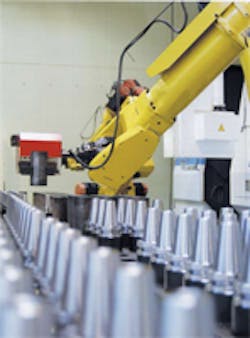Awaji Island, Japan — BIG Daishowa Seiki Co. Ltd. cut its own market niche.
Since its founding in 1967, the company has established itself as an integral part of metalworking in Japan, and has staked out more than 50 percent of the Japanese market for precision tool holding equipment and measuring accessories for itself.
Although it is based in Osaka, Japan, the company has 670 employees who work in five factories on Awaji Island, where its technical and distribution centers are located, and at a factory in Osaka. BIG Daishowa provides more than 1,000 toolholders that range from the largest milling cutters to the smallest toolholders used for drilling and milling.
“No matter what make of machine tool that we talk about, the machine needs good cutting tools and toolholders to perform,” Tsuyoshi Komine said Komine is president and chief executive officer of BIG Daishowa.
He noted that discussing precision is easier than achieving precision and repeated accuracy especially when manufacturers talk about attaining tolerances of 1.0 microns and repeating that accurately in production.
An absolute commitment to precision in all of its manufacturing operations sets BIG Daishowa toolholders apart.
While it purchases coordinate measuring machines and gauges, BIG Daishowa designed and developed many of the measurement systems and inspection techniques that it uses in production to guarantee to itself its production is true. And, all critical parts that it produces are marked with a laser to ensure traceability.
Haruaki Kubo, director and general manager of the engineering department for BIG Daishowa, said the company focuses on four primary factors in making its toolholders to deliver that precision:
• Concentricity.
• Taper straightness.
• Trueness of the taper over its length.
• And, precision flange faces that fit into a spindle without gapping to deliver full-face contact.
Along with the attention that the company gives to the numerous details of manufacturing, keeping its attention on those aspects of its products helps it to maintain the level of precision and accuracy that Komine insists upon.
Part of the company’s culture is its strict adherence to the concept of “monozukuri,” which is a Japanese term for the art of producing and creating products with meticulous care and skilled craftsmanship.
That concept was evident in each of the Awaji Island factories visited in a recent tour. Meticulous attention was given in each of the factories for every aspect of manufacturing from material handling and storage to the painstaking inspection of parts-inprocess and finished products.
